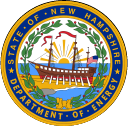State Energy Program
The U.S. Department of Energy's State Energy Program provides funding and technical assistance to the New Hampshire Department of Energy, to enhance energy security, advance energy initiatives, and maximize the benefits of decreasing energy waste.
The New Hampshire Department of Energy administers State Energy Program (SEP) sub-grants to fund the following initiatives.
Building Improvements
This initiative focuses on increasing energy conservation and energy efficiency in New Hampshire's building stock by:
- Maintaining a State Energy Database (Energy Enterprise Management System), used to track energy usage data for state buildings
- Facilitating the State Government Energy Committee to promote and support new energy policy and initiatives aimed at saving energy within state government.
Energy Education and Technical Assistance
The Department provides information and technical assistance to residents, businesses, nonprofits, local governments, energy stakeholder groups and the media on a variety of issues including:
- Fuel prices
- Cost effectiveness of energy efficiency and renewable energy
- Siting regulations for energy systems
- Available incentives and rebates for building improvements
- State energy policies
SEP Program Managers manage and monitor sub-grant recipients, to ensure compliance with state and federal regulations and reporting requirements
The office supports the legislature to advance energy efficiency and renewable energy policy. In addition to monitoring bills, staff participates in legislative hearings and supports the drafting of legislation.
The Department holds an annual state energy conference that gives state employees and legislators the chance to see energy initiatives completed in the state. Through this event, state energy coordinators and building managers can make connections to other energy events being held by the state and the state's utilities. The conference also showcases how state employees play a role in achieving the state's energy efficiency goals.
The Department attends regional and national conferences to learn about best practices and programs, to improve the state's energy efficiency and renewable energy efforts.
Energy Security
The Department participates in drills, exercises and actual events at the state Emergency Operations Center. Additionally, the office works with other agencies and stakeholders to identify interdependencies and proactively improve collaboration during an energy-related emergency.
Transportation
The Department's Transportation Program seeks to increase awareness of alternatives to gasoline- and diesel-powered vehicles among managers of state, municipal, and private fleets, to reduce the number of vehicle miles traveled and to increase the efficiency of state fleets.
Working with other state agencies, including the Department of Environmental Services (DES), as well as with municipal officials, and as a member of a regional transportation collaborative, the Department engages in the following activities:
- Supports the existing Granite State Clean Cities Coalition (GSCCC) by building relationships with fleet managers in the public and private sectors and strengthening relations with industry vendors and consultants.
- Prepares the annual Energy Policy Act compliance report about the state's utilization of alternative fuel vehicles and alternative fuels.



